初中2019中考英语知识点总结笔记
中考英语知识点总结2019

中考英语知识点总结2019
基础语法与句型:
简单句的五种基本句型,包括主语+谓语等结构。
这种句型中的动词大多是不及物动词,动词后不可以直接接宾语,但后面可以跟副词、介词短语、状语从句等。
关系代词和关系副词在定语从句中的正确使用,例如定语从句中关系代词which和that的用法区别。
词汇与短语:
掌握常用动词,如work, sing, swim等,以及它们在不同语境中的用法。
理解并记忆重要的短语和固定搭配,它们在句子中的正确使用对于表达意思至关重要。
代词用法:
掌握代词it的的用法,包括代指前面提到过的事物、代替指示代词this或that、指婴儿或不明身份的人、指时间或季节、指天气以及指距离等。
阅读理解:
阅读理解题型要求学生能够理解文章的主旨大意,捕捉具体细节,并根据上下文推断词义或句意。
写作:
写作部分要求学生能够清晰地表达观点,组织合理的段落结构,并使用正确的语法和词汇。
听力与口语:
听力部分考查学生对日常对话和短文的理解能力。
口语部分则要求学生能够进行简单的日常对话,表达基本的观点和请求。
请注意,
这只是2019年中考英语的一些主要知识点。
具体的考试内容和要求可能因地区和考试机构的不同而有所差异。
因此,建议学生在备考过程中,结合当地的考试大纲和历年真题进行有针对性的复习。
同时,注重日常积累和实践,提高英语的综合运用能力。
2019年中考英语知识点梳理
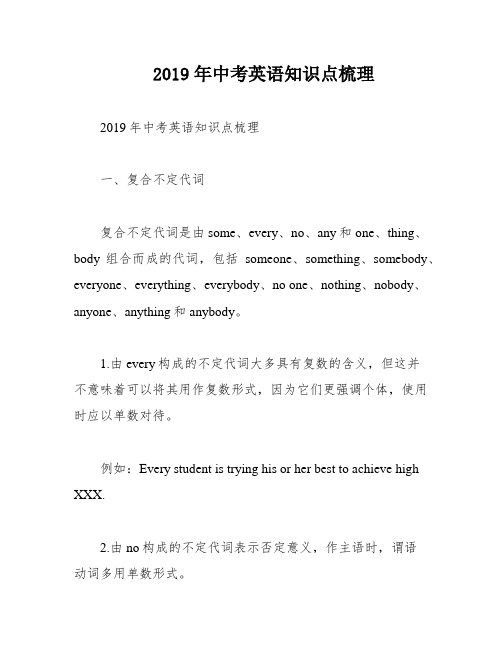
2019年中考英语知识点梳理2019年中考英语知识点梳理一、复合不定代词复合不定代词是由some、every、no、any和one、thing、body组合而成的代词,包括someone、something、somebody、everyone、everything、everybody、no one、nothing、nobody、anyone、anything和anybody。
1.由every构成的不定代词大多具有复数的含义,但这并不意味着可以将其用作复数形式,因为它们更强调个体,使用时应以单数对待。
例如:Every student is trying his or her best to achieve high XXX.2.由no构成的不定代词表示否定意义,作主语时,谓语动词多用单数形式。
例如:Nothing is impossible if you put your heart into it。
二、不定代词之普通不定代词初中阶段常用的普通不定代词包括some、any、few、little、many、much、either、neither、each、every、both、all、none、one和other。
1.some与anysome通常用于肯定句中,在疑问句中,当表示说话人希望得到的肯定回答或表达请求、建议时应用some。
例如:Would you like some coffee。
Yes。
please.any一般用来修饰或代替不可数名词及可数名词复数,多用于疑问句、否定句、条件状语从句中,用于肯定句表示任何一个或任何一些。
例如:Do you have any bread。
I am so hungry.2.many与muchmany修饰可数名词复数,还可以与表示程度的副词如so、too、as、how等连用。
much修饰不可数名词,也可以与表示程度的副词如so、too、as、how等连用。
例如:XXX.XXX.Few and a few are pronouns used to replace or modify countable nouns。
2019年中考英语重点知识归纳整理
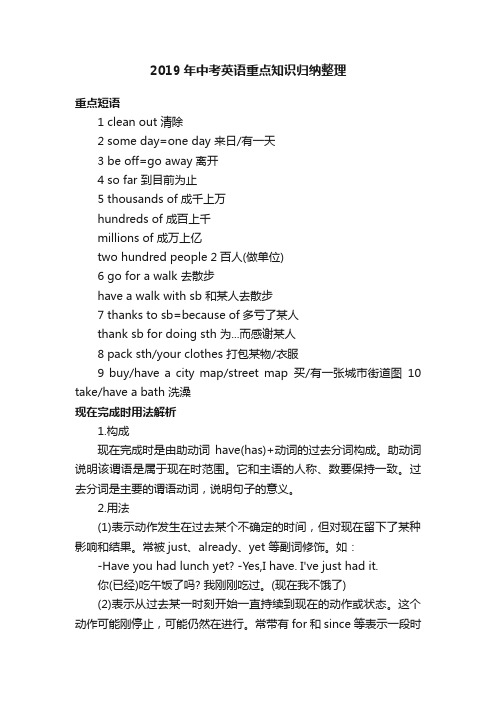
2019年中考英语重点知识归纳整理重点短语1 clean out 清除2 some day=one day 来日/有一天3 be off=go away 离开4 so far 到目前为止5 thousands of 成千上万hundreds of 成百上千millions of 成万上亿two hundred people 2百人(做单位)6 go for a walk 去散步have a walk with sb 和某人去散步7 thanks to sb=because of多亏了某人thank sb for doing sth 为...而感谢某人8 pack sth/your clothes 打包某物/衣服9 buy/have a city map/street map买/有一张城市街道图10 take/have a bath 洗澡现在完成时用法解析1.构成现在完成时是由助动词have(has)+动词的过去分词构成。
助动词说明该谓语是属于现在时范围。
它和主语的人称、数要保持一致。
过去分词是主要的谓语动词,说明句子的意义。
2.用法(1)表示动作发生在过去某个不确定的时间,但对现在留下了某种影响和结果。
常被just、already、yet 等副词修饰。
如:-Have you had lunch yet? -Yes,I have. I've just had it.你(已经)吃午饭了吗? 我刚刚吃过。
(现在我不饿了)(2)表示从过去某一时刻开始一直持续到现在的动作或状态。
这个动作可能刚停止,可能仍然在进行。
常带有for和since等表示一段时间的状语。
如:He has taught here since 1981英语八类基础句型1“主语 + 谓语”(即“主谓”句型)这一句型英汉语言结构形式完全相同,说明“某人或某物如何动作”,或者说“某人或某物自身怎样运动”。
例:They arrived in Harbin yesterday morning。
2019年中考英语必考知识点大全
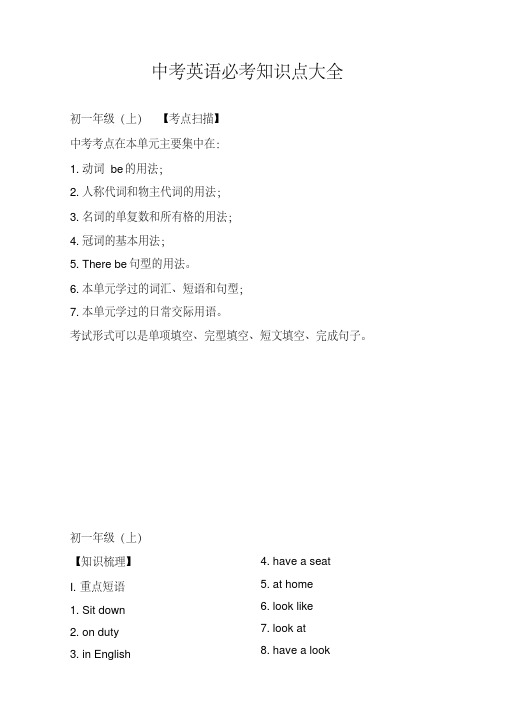
中考英语必考知识点大全初一年级(上)【考点扫描】中考考点在本单元主要集中在:1. 动词be的用法;2. 人称代词和物主代词的用法;3. 名词的单复数和所有格的用法;4. 冠词的基本用法;5. There be句型的用法。
6. 本单元学过的词汇、短语和句型;7. 本单元学过的日常交际用语。
考试形式可以是单项填空、完型填空、短文填空、完成句子。
初一年级(上)【知识梳理】I. 重点短语1. Sit down2. on duty3. in English4. have a seat5. at home6. look like7. look at8. have a look9. come on 10. at work 11. at school 12. put on 13. look after 14. get up 15. go shoppingII. 重要句型1. help sb. do sth.2. What about …?3. Let ’s do sth.4. It ’s time to do sth.5. It’s time for…6. What ’s …? It is …/ It ’s …7. Where is…? It’s ….8. How old are you? I ’m ….9. What class are you in? I ’m in ….10. Welcome to….11. What ’s …plus …? It ’s ….12. I think…13. Who ’s this? This is….14. What can you see ? I cansee ….15. There is (are)….16. What colour is it (are they)? It ’s (They ’re)…17. Whose …is this? It ’s ….18. What time is it? It’s ….III. 交际用语1. Good morning, Miss/Mr….2. Hello! Hi!3. Nice to meet you. Nice to meet you, too.4. How are you? I ’m fine, thank you/thanks. And you?5. See you. See you later.6. Thank you! You ’re welcome.7. Goodbye! Bye!8. What ’s your name? My name is ….9. Here you are. This way, please. 10. Who ’s on duty today?11. Let ’s do.12. Let me see. IV. 重要语法1. 动词be 的用法;2. 人称代词和物主代词的用法;3. 名词的单复数和所有格的用法;4. 冠词的基本用法;5. There be句型的用法。
2019届中考英语考点、知识点大全(完美版)
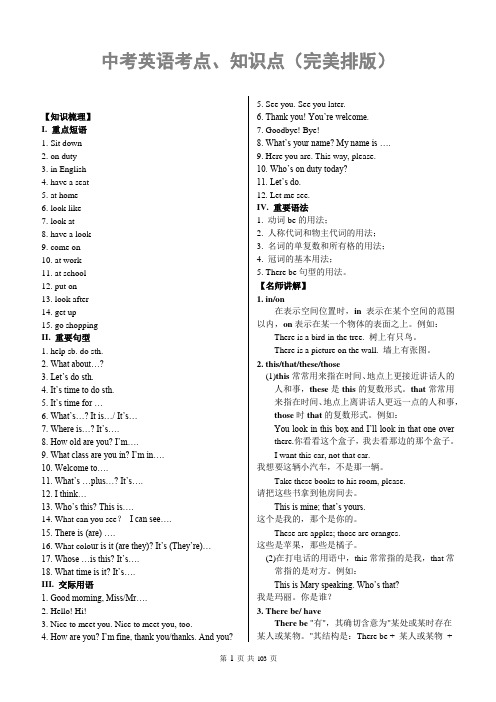
中考英语考点、知识点(完美排版)【知识梳理】I. 重点短语1. Sit down2. on duty3. in English4. have a seat5. at home6. look like7. look at8. have a look9. come on10. at work11. at school12. put on13. look after14. get up15. go shoppingII. 重要句型1. help sb. do sth.2. What about…?3. Let’s do sth.4. It’s time to do sth.5. It’s time for …6. What’s…? It is…/ It’s…7. Where is…? It’s….8. How old are you? I’m….9. What class are you in? I’m in….10. Welcome to….11. What’s …plus…? It’s….12. I think…13. Who’s this? This is….14. What can you see?I can see….15. There is (are) ….16. What colour is it (are they)? It’s (They’re)…17. Whose …is this? It’s….18. What time is it? It’s….III. 交际用语1. Good morning, Miss/Mr….2. Hello! Hi!3. Nice to meet you. Nice to meet you, too.4. How are you? I’m fine, thank you/thanks. And you?5. See you. See you later.6. Thank you! You’re welcome.7. Goodbye! Bye!8. What’s your name? My name is ….9. Here you are. This way, please.10. Who’s on duty today?11. Let’s do.12. Let me see.IV. 重要语法1. 动词be的用法;2. 人称代词和物主代词的用法;3. 名词的单复数和所有格的用法;4. 冠词的基本用法;5. There be句型的用法。
2019中考英语必考知识点总结

2019中考英语必考知识点总结【必背知识点】一. 词汇⑴单词1. 介词:in, on, under, behind, near, at, of1). in表示"在……中","在……内"。
in my bag 在我的书包里in our class 在我们班上2). on 表示"在……上"。
例如:on the wall 在墙上3). under表示"在……下"。
例如:under the tree 在树下4). behind表示"在……后面"。
例如:behind the door 在门后5). near表示"在……附近"。
例如near the teacher's desk 在讲桌附近6). at表示"在……处"。
例如:at school 在学校7). of 表示"……的"。
例如: a map of China 一张中国地图2. 冠词 a / an / the:冠词一般位于所限定的名词前,用来署名名词所指的人或事物。
冠词有不定冠词和定冠词两种。
不定冠词有两个形式,即a和an。
a用在以辅音音素开头的词前,如 a book; an用在以元音音素开头的字母前,如an apple.a或an与可数名词单数连用,泛指某类人或某物中的一个。
the既可以用在可数名词前,也可以用在不可数名词前,表示某个或某些特定的人或事物,也可以指上文提到过的人或事物。
3.some和any①在肯定句中用some.②在疑问句和否定句中用any⑵记住它们的特殊用法。
①some亦可用于表示盼望得到对方肯定的答复或表示建议、委婉请求的疑问句中,这一点我们不久就会学到。
例如:Would you like to have some apples?你想吃苹果吗?②any也可用于肯定句中,表示"任何的"。
2019中考英语重点词语知识点总结
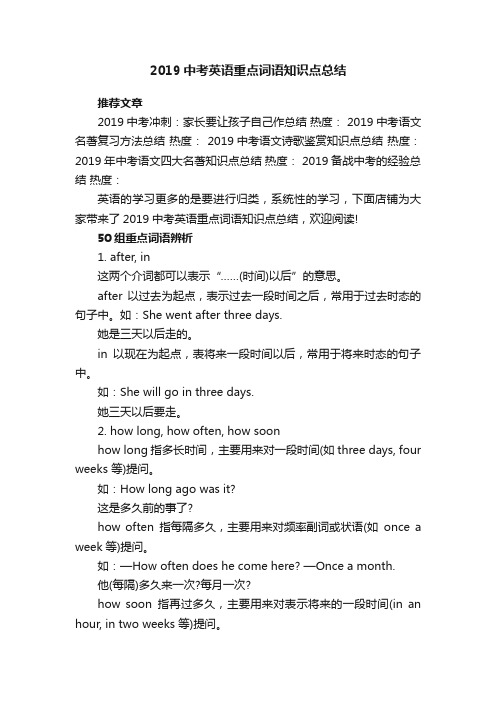
2019中考英语重点词语知识点总结推荐文章2019中考冲刺:家长要让孩子自己作总结热度: 2019中考语文名著复习方法总结热度: 2019中考语文诗歌鉴赏知识点总结热度:2019年中考语文四大名著知识点总结热度: 2019备战中考的经验总结热度:英语的学习更多的是要进行归类,系统性的学习,下面店铺为大家带来了2019中考英语重点词语知识点总结,欢迎阅读!50组重点词语辨析1. after, in这两个介词都可以表示“……(时间)以后”的意思。
after 以过去为起点,表示过去一段时间之后,常用于过去时态的句子中。
如:She went after three days.她是三天以后走的。
in以现在为起点,表将来一段时间以后,常用于将来时态的句子中。
如:She will go in three days.她三天以后要走。
2. how long, how often, how soonhow long指多长时间,主要用来对一段时间(如three days, four weeks 等)提问。
如:How long ago was it?这是多久前的事了?how often指每隔多久,主要用来对频率副词或状语(如once a week等)提问。
如:—How often does he come here? —Once a month.他(每隔)多久来一次?每月一次?how soon指再过多久,主要用来对表示将来的一段时间(in an hour, in two weeks 等)提问。
如:How soon can you come?你多快能赶来?3. few, a few, little, a little, several, somefew 和little的意思是否定的,表示“很少”或“几乎没有”;而a few和a little的意思是肯定的,表示“有一些,有一点儿”。
few 和 a few修饰可数名词;little 和 a little 修饰不可数名词。
2019中考英语知识点总结

2019中考英语知识点总结一、必背知识点总结:1 (see 、hear 、notice 、find 、feel 、listen to 、 look at (感官动词)+do eg:I like watching monkeys jump2 (比较级 and 比较级)表示越来越怎么样3 a piece of cake =easy 小菜一碟(容易)4 agree with sb 赞成某人5 all kinds of 各种各样 a kind of 一样6 all over the world = the whole world 整个世界7 along with同……一道,伴随…… eg : I will go along with you我将和你一起去the students planted trees along with their teachers 学生同老师们一起种树8 As soon as 一怎么样就怎么样9 as you can see 你是知道的10 ask for ……求助向…要…(直接接想要的东西)11 ask sb for sth 向某人什么12 ask sb to do sth 询问某人某事 ask sb not to do 叫某人不要做某事13 at the age of 在……岁时14 at the beginning of …………的起初;……的开始15 at the end of +地点/+时间最后;尽头;末尾16 at this time of year 在每年的这个时候17 be /feel confident of sth /that clause +从句感觉/对什么有信心,自信18 be + doing 表:1 现在进行时 2 将来时19 be able to (+ v 原) = can (+ v 原)能够……21 be afraid to do (of sth 恐惧,害怕……22 be allowed to do 被允许做什么23 be angry with sb 生某人的气24 be angry with(at) sb for doing sth 为什么而生某人的气25 be as…原级…as 和什么一样 eg : She is as tall as me 她和我一样高26 be ashamed to27 be away from 远离28 be away from 从……离开29 be bad for 对什么有害30 be born 出生于31 be busy doing sth 忙于做什么事 be busy with sth 忙于…… 32 be careful 当心;小心33 be different from……和什么不一样34 be famous for 以……著名35 be friendly to sb 对某人友好36 be from = come from 来自37 be full of 装满……的 be filled with 充满 eg: the glass is full of water the glass is filled with water38 be glad+to+do/从句39 be going to + v(原)将来时40 be good at(+doing) = do well in 在某方面善长, 善于…… 41 be good for 对什么有好处42 be happy to do 很高兴做某事43 be helpful to sb 对某人有好处44 be in good health 身体健康45 be in trouble 处于困难中46 be interested in 对某方面感兴趣47 be late for = come late to 迟到 eg: Be late for class 上课迟到48 be like 像…… eg : I'm like my mother49 be mad at 生某人的气50 be made from 由……制成(制成以后看不见原材料)51 be made of 由……制成(制成以后还看得见原材料)52 be not sure 表不确定53 be on a visit to 参观54 be popular with sb 受某人欢迎55 be quiet 安静56 be short for 表**的缩写 eg: 陶 is short for 陶俊杰57 be sick in bed 生病在床58 be sorry to do sth be sorry for sb eg : I am sorry for you59 be sorry to hear that60 be sorry to trouble sb61 be strict in doing sth 严于做某事62 be strict with sb 对某人要求严格63 be strict with sb in sth 某方面对某人严格64 be supposed to do 被要求干什么65 be sure 表确定66 be sure of doing sth 对做某事有信心67 be sure of sth 对做某事有信心68 be sure that sth 对做某事有信心69 be sure to do sth一定会做某事We are sure to learn English well 我们一定能学好英语70 be terrified of + 名/动doing 害怕……71 be terrified to do sth 害怕做某事72 be the same as …和什么一样73 be used to doing sth 习惯做某事 My father is used to getting up early 我爸爸习惯早74 be worth doing 值得做什么75 be(feel) afraid to do sth 害怕做某事be afraid of sth 害怕某物 be afraid that 丛句76 because+句子 because of +短语eg : He was late because he had a headache He was late because of his headache77 begin to do = start to do 开始做某事start…with…=begin…with…以什么开始什么78 between…and…两者之间79 borrow sth from sb 向……借…… lend sth to sb ( lend sb sth借给……什么东西80 both = the same(as) = not different(from) 表相同81 bother 打扰 bother sb to do stheg : I'm sorry to bother you ,but can you tell me to way to the station我十分道歉打扰你,但是你能告诉我怎么去车站82 by the end of 到……为止83 call sb sth eg : We call him old wang85 catch up with sb 赶上某人86 chat with sb 和某人闲谈 take sb to + 地点带某人去某地87 come in 进88 come over to 过来89 come up with 提出 eg: Can you come up with a good idea 你能想出一个好办法吗?90 communicate with sb 和某人交流91 consider + doing 考虑做什么 eg : Why n ot consider going to lu zhou 为什么不考虑去泸州?92 dance to 随着……跳舞93 decide to do sth 决定做某事94 do a survey of 做某方面的调查95 do better in 在……方面做得更好96 do wrong 做错97 Don't forget to do sth 不要忘了做某事98 Don't mind +doing /从句 /名词不要介意…… 99 each +名(单)每一个…eg : Each student has many books 每一个学生都有一些书 100 end up +doing101 enjoy +doing喜欢102 escape from 从……逃跑103 expect to do sth 期待做某事104 fall down 摔下来 fall off 从哪摔下来105 fall in love with sb /sth 爱上什么106 far from 离某地远107 find +it +adj +to do 发现做某事怎么样108 find sb/sth +adj 发现什么怎么样 eg : I find the book interesting109 finish 完成+doing(名词)110 fit to sb = be fit for sb 适合某人111 forget to do 没有做而忘了 forget doing 做了而又忘了112 from…to…从某某到某某 eg: From me for her113 get /have sth down 做完,被(别人)做…eg: I have my hair cut 我理了发(头发被剪了)Tom got his bad tooth pulled out 汤母把他的坏牙拔掉了(被牙医拔掉了)114 get a part-time job= find a part-time job115 get along well with sb = get on well with sb 与某人相处得好116 get along with sb = get on with sb 与某人相处117 get ready for = be ready for为什么而准备118 get sb in to trouble 给某人带来麻烦120 get…from…从某处得到某物121 give a talk 做报告122 give sth to sb give sb sth 给某人某物123 go fish 钓鱼 go swimming 游泳124 go on to do 去做下一件事 go on doing 继续做这件事125 go out away from远离 go out of 从….离开126 go to school 上学(用于专业的)go to the school 去学校(不一定是上学)127 good way to 好方法128 hate to do 讨厌没做过的事 hate doing 讨厌做过的事129 have a party for sb 举办谁的晚会130 have a talk 听报告谈一谈131 have been doing 现在完成进行时132 have been to …( 地方)……去过某过地方have gone to …(地方)去了某地还没回来133 have fun +doing 玩得高兴134 have sth to do 有什么事要做135 have to do sth 必须做某事136 have trouble (problem) (in) doing sth 做什么事情有麻烦137 have…time +doing138 have…(时间)…off 放……假 139 hear sb +do/doing 听见某人做某事/正在做某事140 help a lot 很大用处141 help sb with sth \one's sth 帮助某人某事(某方面) help sb (to)do sth 帮助某人做某事142 hope to do sth 希望做某事143 How about(+doing) = What about(+doing)144 how do you like = what do you think of 你对什么的看法145 if : 是否=wethereg: I don't know if (wether) I should go to the party 我不知道我是否应该去参加晚会He don't know if (wether) we will arrive on time tomorrowmorning 他不知道我们明天早上是否能准时到达146 if :如果,假如(全部接一般时态)+条件语态从句eg: I'll go to LuZhou if it does't rain 假如明天不下雨,我就去泸州If they change the plan they will let me know 假如他们要改变计划,他们会让我知道的I'll go to England ,if I have enough money next year 如果我明年由足够的钱,我就要去英国147 in one's opinion = sb think 某人认为148 in some ways 在某些方面149 in the end = finally(adv) 最后150 in the north of…什么在什么的北方(north 北 sowth 南west 西 east 东)151 in the sun 在太阳下152 increase 增加eg : They've increased the prece of petrol by 3% 他们把石油价增加了3%153 instead of +(名)代替eg: I'd like an apple instead of a pear 我想要苹果,而不要梨子 154 introduce sb to sb 介绍某人给某人 introduce oneself 自我介绍155 invite sb to do sth 邀请某人做某事156 It takes sb sometime to do sth 做某人花掉某人多少时间eg : It took me 5 minutes to do my homework It takes me half anhour to cook157 It's +adj +for sb to do sth 对某人来说做某事怎么样158 It's +adj +to do 做某事怎么样159 It's +adj for sb 对于某人来说怎么样 It's +adj of sb对某人来说太怎么样160 It's +adj(for sb) to do(对某人来说)做某事怎么样 It's +adj of sb to do sth 对某人来说做某事太怎么样eg : It's nice of you to help me with my English161 It's a good idea for sb to do sth 对……来说是个好主意162 It's important to sb 对某人来说很重要 eg: It's important to me163 It's time to do sth It's time for sth 到了该去做某事的时间 eg : It's time to have class It's time for class 该去上课了164 join = take part in 参加165 just now 刚才166 keep +sb /sth +adj /介词短语让什么保持什么样?167 keep out 不让……进入168 keep sb adj 让……保持…… keep healthy 保持健康169 key to +名词表示:某物的钥匙或某题的答案170 key to… anser to …key 可以是答题或钥匙171 laugh at…取笑……172 learn by oneslfe 自学173 learn from sb 向某人学习174 learn to do sth 学做某事175 let sb do sth 让某人做某事176 Let sb down 让某人失望 eg : We shouldn't let our farents down我们不应该让我们的父母失望177 live from :离某地远178 live in +大地方 /at +小地方居住在某地179 look after = take care of 照顾照看180 lose one's way 谁迷路181 make a decision to do sth 决定做某事182 make friends with sb 和谁成为朋友 eg : I want to makefriends with you183 make it early 把时间定的早一点184 make on exhibition of oneself 让某人出洋相185 make sb /n +n 使什么成为什么 eg : I made her my step mollerI made you my wife186 make s b /sth +adj 使某人(某物)怎么样 eg : You must made y our bed clean187 make sb /sth adj 使某人/某物怎么样188 make sb do sth 让某人做某事189 make up be made up of (被动语态)由……组成190 make…difference to… 191 mind sb to do mind one's doing 介意……做什么192 most +名 most of +代193 much too +形容词194 must be 一定195 need +名词196 need sb do sth 需要某人做某事197 need to do (实义动词) need do (情态动词)198 no /neithr of hate to do no /neithr of hate doing199 no +名词200 not anymore = no more 再也不…… eg: He didn't cry any more 201 not… (形、副)at all eg: He's not tall at all she doesn't junp far at all202 not…at all 一点都不203 not…either 表否定,也不 eg : I don't japanse either I don't have sister, either 我也没有姐姐204 not…until 直到……才……205 offer / provide sb with sth 给某人提供206 offer sb sth ( offer sth to sb 提供什么东西给某人 eg : I offeryou water (I offer water to you 我给你提供水207 on one's way to…在谁去那的路上208 on the one hand 一方面 on the other hand 另一方面209 on the phone = over the phone 用电话交谈210 on time 准时 in time 及时211 one day =some day =someday 一天,有一天212 one of +可数名词的复数形式213 one to another 一个到另一个214 over and over agin 一遍又一遍的 eg : He cleaned the floor over and over agin215 part-time job 兼职工作 fall-time job 全职工作216 pay for…付……钱 pay the bill 开钱,付钱217 please +do218 please help yourself219 pleased with sb220 pool into = pore into221 practice +doing 练习做某事222 prefer sth to sth 相对……更喜欢…… eg : I prefer physicsto chemisty 在物理和化学中,我更喜欢物理prefer sb not to do sth 更愿意… eg: I prefer her not to come 我不喜欢她不来223 pretend to do sth 装着去做什么 pretend that 从句eg : The two cheats pretended to be working very hard 这两个骗子装着努力工作224 rather…than 宁可……也不……eg : I would rather be a doctor than a teacher 我愿肯当医生,也不当老师225 regard…as 把……当作…… I regard you as my friend 我把你当作我的朋友226 remid sb about sth 提醒某人什么事 remid sb to do sth 提醒某人做某事eg : he remids me about cooking (he remids me to cook 他提醒我做饭227 remid sb of sth 使某人想起什么the words that (which) the teacher talke to remind me of my mother228 return sth to sb 还什么东西给某人229 say to oneself 对自己说230 say to sb 对某人说231 sb spend somemoney on sth 花了多少钱在某事上232 sb spend sometime with sb 花了多少时间陪谁233 sb spend sometime(in) doing sth 花了多少时间做某事234 sb with sb +is sb and sb +are235 see sb do 看见某人做过某事 see sb doing 看见某人正在做某事236 seem to do/be +adj 显得怎么样 eg : You seem to be tiredYou seem to be happy237 send +sb sth 送给某人某物238 send…to…把什么寄到哪里去?239 shock 使……震惊 eg : Oh , It's only you ! You give me a shock 啊,是你呀!吓我一跳240 show sb sth 向某人展示某物241 show sb sth = show sth to sb 拿什么东西给某人看242 show sth to sb 向某人展示某物243 some…others…一些……另一些…… 244 start…with…从……开始begin…with…从……开始245 stay away from 远离……eg : We're told to stay away from the animals whe visiting the zoo当我们参观zoo 时,我们要远离动物246 stop doing 停下正在做的事247 stop sb from doing sth 阻止某人做某事248 stop sb(from) doing 阻止某人做某事249 stop to do 停下正在做的事去做下一件事250 such +名这样,这种251 suit sb 适合某人252 surprise sb 使某人惊奇 to one's surprise 令某人惊奇253 take classes 上课254 take sb to 把某人带去 eg : I take you to the hospital255 take walks = take a walk = go for a walk 散步256 ①talk to 对谁说② talk with 和谁说③ talk of 谈到④ talk about 谈论关于…… 257 talk with sb 和某人说话258 teach sb sth 教某人做某事259 tell sb do sth 告诉某人做某事261 tell sb sth 告诉某人某事 tell sb that 丛句 tell sb not to do sth 262 tell sb 〔not〕 to do sth 告诉某人做什么263 tell…from…区别264 thank you for +doing265 the same +名词(doing)+as…… 266 the same…(名)…as as…(adj adv)…as 相同267 the way to do sth = the way of doing st做某方面的方法the way to +地方去哪的路e g :Do you know the way to learn English Do you know the way oflearning English268 the way to…(地点)到哪的270 transalte ……into……把什么翻译成什么 eg : Trasalte Englishinto chinese271 travel with sb和某人去旅游272 try one's best to do sth尽某人最大的努力去做某事eg: I will try mybest to learn English well273 try to do sth 想干什么,但没成功 try doing sth 想干什么,已经做过了274 try…试衣服 have a try 试一下275 turn down 开小←→ turn up 开大276 turn off 关上←→ turn on 打开 open 拆开277 upside down 倒着278 visit to…参观某个地方279 wait for sb 等某人【比较since和for】Since用来说明动作起始时间,for用来说明动作延续时间长度。
- 1、下载文档前请自行甄别文档内容的完整性,平台不提供额外的编辑、内容补充、找答案等附加服务。
- 2、"仅部分预览"的文档,不可在线预览部分如存在完整性等问题,可反馈申请退款(可完整预览的文档不适用该条件!)。
- 3、如文档侵犯您的权益,请联系客服反馈,我们会尽快为您处理(人工客服工作时间:9:00-18:30)。
初中英语笔记● This is the key to the door .这是开门的钥匙。
● ⎪⎩⎪⎨⎧电话号码电话号码at .sth .sb call call sb. = phone sb. = ring sb. upplease give me a call .请打电话给我● family 指家庭时是单数,谓语动词用“is ”,family 指家人时是复数,谓语动词用“are ”。
● of 表示无生命物体的所有格,s 表示有生命物体的所有格。
有生命物体的所有格也可以用of ,但有生命物体后要加“s ”。
● 以副词there 或here 开头的句子常要倒装,以示强调。
● What’s your name, please? = Could you tell me your name, please? = May I have your name, please? ● Nice to meet you. = Glad to meet you. = Pleased to meet you.● 写启示的方法:1.启示的主题;2.描述细节;3.留下联系方式。
● 表示惊讶、忧伤、微怒、失望等,可以用dear 作感叹词。
● 名词如果有数量词修饰它,使用谓语动词适应看他的数量词,如:⎩⎨⎧ keys of sets two are here keysof set a is here● get to somewhere (get home 除外)到达……● ⎩⎨⎧)无生命物体的“有”(is there )有生命物体的“有”( have 有 ● 肯定:Let+宾语(人称代词的宾格或名词)+ V 原型+……否定:Don’t let +宾语+V 原型+……/Let + 宾语 + not + V 原型+……● have 表示“有”时才可以用来提问或写成否定“haven’t”。
● ⎩⎨⎧⋯⋯⋯⋯? you will 问: )听话的人include 不(us Let ? we shall 问: )说话的人和听话的人(include s Let'myself (我自己) yourself (你自己) himself (他自己) herself (她自己) itself (它自己) ourselves (我们自己) yourselves (你们自己) themselves (他们自己)● How much + be + 商品?(答:It’s/They’re……) = What is the price of ……?(答:It ’s ……) ● cent 美分 One dollar =100 cents●other(两者中的另一个) another(三者中的另一个)●越接近物品本身性质的形容词越靠近物品,如:big blue hat●帮助某人做某事help sb. (to) do sth.help sb. with sth.with the help (n.) of sb. e.g. He studies math well, with the help of teacher.●一般将来时的一般形式:主语+will+动词原形+……●Can I help you? = What can I do for you? = (Is there) anything I can do for you?●“hundred,thousand”与基数词一起表示具体数字时不加“s”。
hundreds of 上百 thousands of 上千●buy sth. for sb. = buy sb.(间接宾语) sth.(直接宾语)为某人买某物●any body 在肯定句中表示任何人,在否定句和疑问句中不是。
●for表示动词的对象或接受者,表示用途,表示目的,表示等价交换或标注价格,表示时间持续多久,表示距离,表示理由或原因。
There are many trees on each side of the roadThere are many trees on both sides of the road●the price is low(high) 价格低(高)The elephants are kind of cute.●含有think的宾语从句中如果从句中有否定,要否定前移,如:She doesn’t think they are boring.(她认为他们不无聊)●问:How are you?答:I’m fine. (我很好。
)/Just so so.(一般般。
)●表示时间、价格、距离的名词作主语,谓语动词用单数。
如:Two dollars is enough(足够)。
●怎么判断双音节单词中第一个音节是开音节还是闭音节:双音节单词中的两个元音是两个音节的中心,元音是由元音字母或元音字母组合发出的音,因此,首先找到单词中的两个元音字母或元音字母组合,两个中心就清楚了。
两个中心之间的辅音字母(不是字母组合)则分别划归两个音节,第一个音节即为闭音节,如果两个中心之间的辅音字母为双写字母(包括“r”),分别划归前后,第一个音节按闭音节读音。
如:paper /’peipə/ (pa为开音节) member /’membə/ (mem为闭音节) happy /’hæpi/ (hap为闭音节) sorry /’sɔri/ (sor为闭音节) certainly /’sə:tnil/●I am sorry. I can’t go with you. (对不起。
我不能和你一起去。
)●Thanks. / Thank you. / Thank you very much. / Thank a lot. / Many thanks.●You are welcome. / That’s OK. / That’s all right.●It’s my pleasure. / With pleasure. (这是我的荣幸。
)●make friend with sb. (和……交朋友)●Thanks for + n. / v.ing = Thanks sb. for + n. / v.ing●below 在……下方(非正下方)反义词:above 在……上面(非正上方,没有接触面)under 在……下面(正下方)反义词:on(有接触面),over(没有接触面)在……上面(正上方)●keep + sth. + adj. 使某物保持某状态。
keep + adj. 保持某状态。
●表示请求、建议、希望得到对方肯定回答的疑问句用“some”。
●问:Let……答:OK. / All right. / Tha t’s a good idea. / That sounds good. / Sorry.●sport用来修饰名词要变为sports。
●play + the + 乐器 Erhu除外●be动词后叫表语,修饰名词叫定语,修饰动词叫状语,前后两词对等叫同位语。
●人民币和日元变复数不变,其他要。
●be good with sb. = get on well with sb. 与某人相处的很好●问:How often does Rick run on weekend?答:Rick usually runs on weekend.●always(总是) usually(通常) often(经常) sometime(有时) seldom(很少) never(从不)●频度副词放在be动词或助动词之后,实意动词或行为动词之前。
●感叹句:What + (a/an) + adj. + n. + (主) + (谓)!如:What beautiful flowers they are!How + adj. /adv. + (主) + (谓)!如:How beautiful the flowers are!●Can you think what his job is? 含有宾语从句的复合句,宾语从句的从句必须是陈述句。
●Start to do sth. 开始做某事●be famous for……因……出名●●for + 时间段……做某事持续多久●问:How long do you have volleyball?答:I have volleyball for two hours.●ask sb. some questions. 问某人一些问题ask sb. to do sth. 叫某人做某事●no =not any●because不和so同时使用,although(尽管)不和but同时使用。
neither:两者中的任何一个都不。
●用“may”提问的句子回答用can/can ‘ t或must / mustn’ t;用“can”提问的句子回答用can/can’t;用“must”提问的句子回答用need/needn’t.如:1. May I park my car here?Yes, you can / must. / No, you can’t / mustn’t.2. Can I watch TV?Yes, you can. / No, you can’t.3. Must I clean the classroom this morning?Yes, you need. / No, you needn’t.●be afraid of doing sth. / be afraid of sth. 害怕做某事/某物●be fond of = like●make a continuation to sth. 对……有贡献●do well in = be good at 擅长……●比较级 + and + 比较级越来越……●give back = return 归还●法国人单数:Frenchman/Frenchwoman英国人单数:Englishman/EnglishwomanChinese和Japanese单复数同形●in the world 在世界上all over the world / around the world / the whole word 全世界●in the school 在学校里in school 在学校学习●outside 在……外面outside the gate to the park 在公园门外●turning 转角●go down + ……沿着……路走go straight down + ……沿着……路直走●enjoy doing sth. 喜欢做某事enjoy oneself = have a good time = have fun●take a walk = go for a walk = have a walk●the beginning of ……的开始at the beginning of 强调在……开始的那一刻in the beginning 起初,一开始 from the beginning 开始时 from beginning to end 从开始到结束 ●visit + 地点、参观某地 a visit to + 地点、参观某地 ●have fun doing sth. 做……很开心 ●地点 + is a great place to do sth. ……是一个做……的地方 ●be busy with sth. 忙于某事 ● the way to ……去……的路on the way to + 地点 在去……的路上on one’s way to + 地点 某人在去……的路上on my way to home 在我回家的路上● 把某物递给某人sth. sb. pass sb. to sth. pass ⎭⎬⎫ ●⎩⎨⎧++++小地方at 大地方in arrive ● ⎪⎩⎪⎨⎧school reach school to get school at arrive 到达学校● 主语 + hope(that) + 从句主语 + hope + to do sth.● live on ……靠……为生● {{{⎪⎪⎪⎩⎪⎪⎪⎨⎧++⎩⎨⎧++主语为人主语为物(强调金钱)时间、金钱主语为人时间、金钱做某事要花某人多少时间、金钱主语为物花费pay yuan. 3 me costs book This cost sth. doing sth./(in)on spend spend sth. do .to sb. It takes take● ⎪⎩⎪⎨⎧触面指从上空穿过、没有接指从内部穿过面指在表面穿过、有接触over through across ● Why not do sth. ? 表建议:为什么不做……呢?Why don’t you do sth. ? 表疑问:你为什么不要……? ● ⎩⎨⎧++代词名词短语名词句子//because because。
